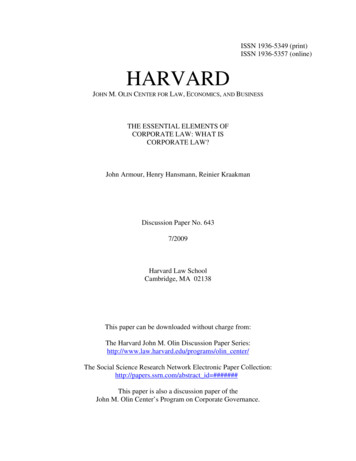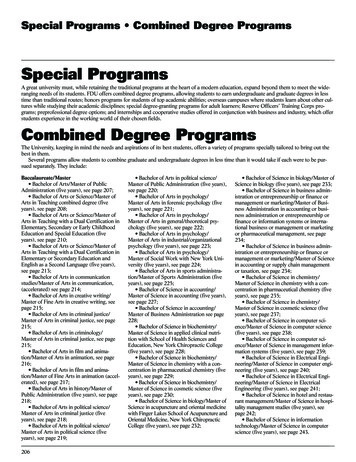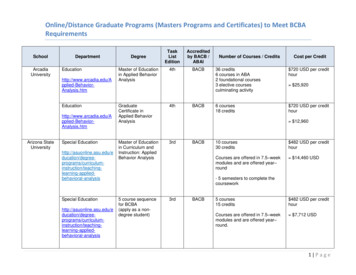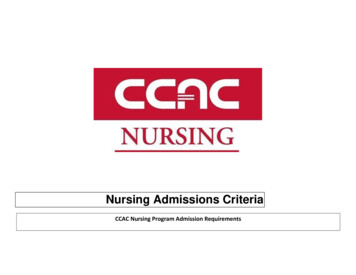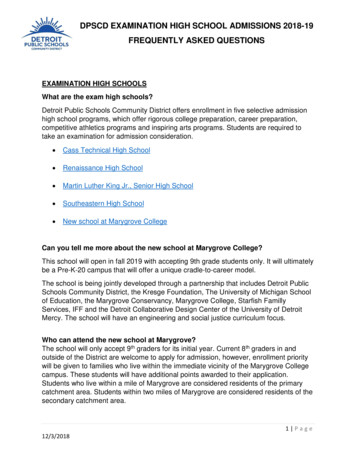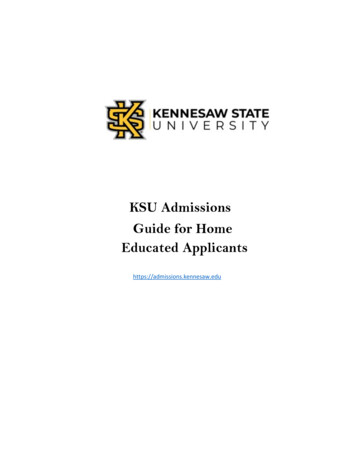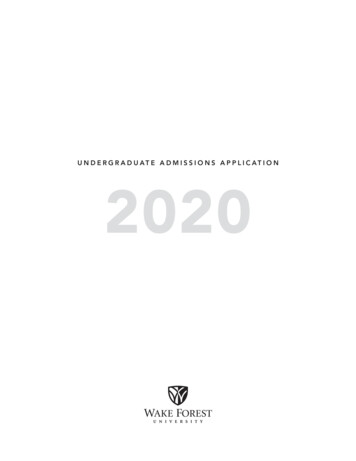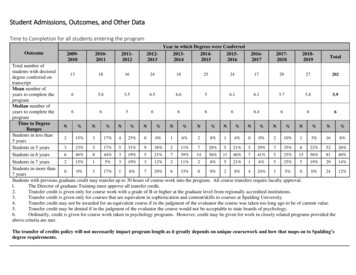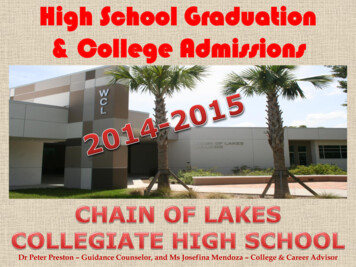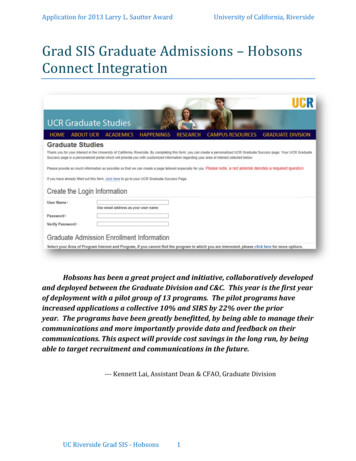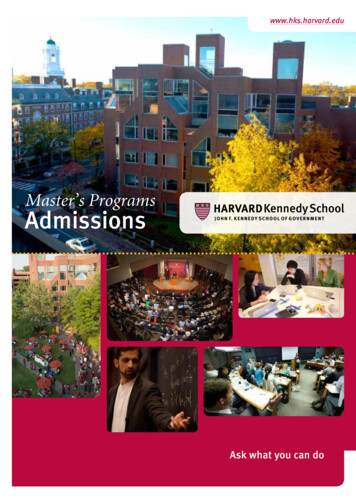
Transcription
www.hks.harvard.eduMaster’s ProgramsAdmissions
WhyHARVARDKENNEDYSCHOOLEvery generation faces an opportunity and a responsibility to meet the great challenges of its era. Today’s mostcompelling global issues — from nuclear proliferation toclimate change to entrenched poverty — are complex,interrelated, and urgent. They require bold thinking andpassionate leaders with the courage and the spirit toturn ideas into action.At Harvard Kennedy School, ourmission is to educate exceptionalpublic leaders and generate ideas thathelp solve public problems. Throughour rigorous educational programsand cutting-edge research initiatives,we seek to influence and improvegovernance and the developmentof smart public policy at all levels.Harvard Kennedy School brings together from across continents andsectors a unique and diverse groupof individuals who are committedto the public interest. Scholars andpractitioners, public officials andsocial entrepreneurs, educators andstudents, teach and learn from oneanother in a vibrant atmosphereof intense inquiry and open dialogue.This unique learning environmentprovides a stimulating setting inwhich to develop highly skilled publicleaders and innovative solutions thatcan influence societies and improvelives. At Harvard Kennedy School, wetake great pride in the internationalconnections we make, the professional networks we facilitate, and theinspiration we evoke.If you are prepared to engage andbe engaged — if you care deeplyabout the world and are committedto helping lead the way toward a betterfuture — Harvard Kennedy Schoolpresents an opportunity like no other.We invite you to ASK WHATYOU CAN DO
DENTDataHarvard Kennedy School attracts a diverse group ofcandidates. Below is a snapshot of our degree programsbased on a five-year average.MPPMPA/IDMPAMC/MPAEntering Class2256978206Average Age27293039Average Years Worked34513Gender52% male48% female54% male46% female62% male38% female63% male37% femaleDegree Programs*International28%76%56%Students**56%U.S. Students36%40%43%of Color***30%Joint/ConcurrentyesyesProgram Optionyesno* Includes students in the mc/mpa Mason Program** Defined as non-resident aliens*** R epresents the percentage of U.S. citizens and permanent residents who are students of colorJoint and Concurrent Programsmpp, mpa/id, and mpa students maydo joint or concurrent programs withother professional schools at Harvardor with selected professional schoolsoutside Harvard.HARVARDJOINT DEGREESmpp, mpa/idt Harvard Business Schoolt Harvard Law SchoolHARVARDCONCURRENT DEGREESmpp, mpa/id, mpat Harvard Divinity Schoolt Harvard GraduateSchool of Designt Harvard Medical Schoolt Harvard Schoolof Dental MedicineCONCURRENTBUSINESS DEGREESCONCURRENTLAW DEGREESCONCURRENTMEDICAL DEGREESmpp, mpa/id, mpat Dartmouth, Tuck Schoolof Businesst MIT Sloan Schoolof Managementt Stanford GraduateSchool of Businesst University of Pennsylvania,The Wharton Schoolmpp, mpa/id, mpat Columbia Universityt Duke Universityt Georgetown Universityt New York Universityt Northwestern Universityt Stanford Universityt University of California,Berkeleyt University of Michigant University of Pennsylvaniat Yale Universitympp, mpa/idt University of California,San FranciscoSchool of MedicinetO ther schools on acase-by-case basisTo learn more about our joint and concurrent programs, visitwww.hks.harvard.edu/joint1
MPPThe two-year Master in Public Policy (mpp) is a rigorous programthat prepares students to understand complex policy problems andto craft concrete solutions. Through courses, exercises, and fieldwork,students master a conceptual tool kit that draws on the socialsciences but is adapted for action. mpp candidates arrive at HarvardKennedy School committed to improving the world, and they equipthemselves to do so by developing broad-spectrum analyticcompetency. This defining feature of the mpp translates into intellectual honesty, a hunger for evidence, and the capacity to extractanswerable questions from the messy clutter of real-world publicproblems. Students develop familiarity with a wide range of analyticmethods and the habit of picking the right tool to fit the task.www.hks.harvard.edu/mpp“Professionally and personally, thempp experience was transformative.After ten years in the private sector,I felt the two-year mpp would allowtime to explore my interests in publicservice and reset my professionalpriorities. It led to the Boston mayor’soffice and the most rewarding job I’dever had the privilege to undertake.Personally, I was inspired to find sucha civic-minded, passionate, anddiverse group of classmates. I continue to marvel that I get to countmyself among them.”Katharine Lusk mpp 2012United StatesExecutive Director,Initiative on Cities at Boston University2“hks offered me the chance to find acommunity, to help improve a community,and therefore to better myself as apublic servant.”Jonathan McMaster mpp 2013United StatesU.S. Diplomat, Department of State
MPA/IDCurriculumPOLICY AREASmpp candidates are arranged in “cohorts” of roughly55 students for a first-year core curriculum featuring policyanalysis, economics, management and leadership, empiricalanalysis, negotiation, ethics, and politics. The first yearculminates in a Spring Policy Exercise, and most studentsspend the summer in a policy-oriented internship. The PolicyAnalysis Exercise (pae) — a client-driven, often team-basedpracticum — caps the second-year curriculum.Spring Policy ExerciseThe Spring Policy Exercise isa multi-week simulation thatchallenges students to intellectually integrate and practically apply the disciplinestaught in the mpp core.The exercise gives studentsthe opportunity to applycore tools and concepts toa complex policy problem in asetting and at a pace similarto those of a professionalenvironment. It serves as acapstone to the first-year coreand a bridge to the secondyear pae and subsequentprofessional work.MPAAs a complement to the mpp corecurriculum, students are requiredto specialize in a policy area ofconcentration (pac) or a concentration. mpp candidates develop expertise in their areas throughrequired and elective courses and apolicy-oriented seminar, which culminates in the generationof the pae.MC/MPAStudents choose from thefollowing policy areas:— Business andGovernment Policy— Democracy, Politics,and Institutions— International andGlobal Affairs— InternationalDevelopment— Social and Urban PolicyMASTER’S DEGREESMPPPolicy Analysis Exercise (PAE)Past Spring Policy Exercise topicshave included: Better Schools for Boston Haiti: The Way Forward Sex Trafficking: Global Challenge,Local Solutions Preparing for the Next PandemicThe pae is an analytic andconsultative professionalproduct, typically about 40pages, in which studentsexamine an existing publicor nonprofit policy or management issue presented bya client. An applied thesis,the pae allows students tointegrate and apply the technical skills and specializedknowledge they have gainedthrough their coursework.mpp graduates often pointto the pae as a highlight oftheir hks education.Past PAE projects have included: Policy recommendations to aninternational nonprofit organization for promoting human rightsbest practices in the energyindustry Social media strategy for a majorU.S. city police department High-tech growth plan for thepresident’s office of a developingcountry Analysis for a U.S. federal government agency of the impact ofeducational technology programson learning outcomes for migrantstudentsMPP CLASS of 2016Employment OverviewUnspecified 2%Private Sector 47%MPP GRADUATESNational/FederalGovernment 18%State/ProvincialGovernment 5%City/Local/RegionalGovernment 3%IGOs 3%NGOs and Nonprofits22%mpp graduates apply their coretraining, policy interests, and functional skills to roles and organizations across employment sectors.The majority of MPPs find positionsin the public and nonprofit sectorsfollowing graduation. However,each graduating class demonstratesa wide diversity of employmentpreferences.Positions secured by MPPsfollowing graduation include:t Policy analyst at a globaladvocacy organizationtP residential Management Fellowsat usaid, U.S. Department ofEnergy, and U.S. Departmentof State, among otherst Program evaluation officer fora public school systemt Project manager at anintergovernmental organization3
MPA/IDThe two-year Master in Public Administration in InternationalDevelopment (mpa/id) is designed to prepare the next generationof leaders in international development. It is an economicscentered multidisciplinary program that combines rigoroustraining in analytic and quantitative methods with an emphasison policy and practice. Applicants must demonstrate competencein economics and quantitative analysis as well as leadershippotential in international development. Most admitted candidateshave at least three years of development-related work experience,typically in developing or transitional economy countries.www.hks.harvard.edu/mpa-id“The two years at the mpa/id provedto be the most valuable and stimulating of my life. The program placedme in the middle of a unique andbrilliant group of colleagues andprofessors, opening my mind to newchallenges, solutions, and opportunities in the realm of what became mypassion: inclusive economic growth.”Rafael Puyana mpa/id 2013ColombiaAssistant Director for Science, Technology,and Innovation at the National PlanningDepartment of Colombia“To understand the most pressing internationaldevelopment challenges and, importantly, tothrive as a professional seeking to addressthese problems, a rigorous understanding ofeconomics is absolutely essential.”Molly Kinder mpa/id 2008United StatesConsultant, Global DevelopmentInnovation Ventures4
MPA/IDCurriculumMPAMC/MPAThe core courses include:— Advanced MicroeconomicsAs part of a multidisciplinary core curriculum, mpa/idstudents take microeconomics, macroeconomics, andeconometrics sequences. These courses are taught atthe level of a first-year course in a top PhD program ineconomics, but with an emphasis on policy applicationsto development rather than pure economic theory.— Advanced Macroeconomics— Advanced Statistics and Econometrics— Economic Development:Theory, Evidence, and Policy Design— Management in a Development Context— Institutions in Development— Good Governance— Applications and Cases inInternational DevelopmentMASTER’S DEGREESMPP— Second Year Policy Analysis (sypa)Summer Internshipmpa/id students spend thesummer between their firstand second years working ondevelopment projects, usually in developing countries.These internships arehands-on opportunities forstudents to put the skillsthey have learned in theirfirst year to the test, and togain additional real-worldexperience and guidance asthey think about the careersthey will pursue after hks.Students with substantialSecond Year Policy Analysis (sypa)previous work experienceuse their internships toexplore new organizations,areas of interest, or regionsof the world. Some studentschoose to build on their internship experience whenthey write their Second YearPolicy Analysis.MPA/ID CLASS of 2016Employment OverviewThe Second Year Policy Analysis is an integral part of thempa/id program. Designedto serve as a capstone experience, the second yearpaper offers students an opportunity to deploy the skillsthey acquired during theprogram, integrate theircoursework, and design andpresent policy recommendations for a concrete development problem. In the sypa,students pose a policyquestion and draw on theireconomics, management,and institutional analysistraining to develop convincing recommendations.Past sypa projects have included: Examining why womenentrepreneurs in Uganda tendto enter low-wage, low valueadded sectors Promoting manufacturing foreigninvestment from China to Ethiopia Improving targeted outcomesin social programs in Peru Assessing potential demand forfinancial services in remoteregions of East Malaysia Evaluating a microsavingsintervention in rural MexicoMPA/ID GRADUATESPrivate Sector 37%National/FederalGovernment 18%State/ProvincialGovernment 7%City/Local/RegionalGovernment 2%NGOs and Nonprofits21%IGOs 16%Through the mpa/id program,students share a curriculumand training in the field ofinternational development.Although the sector, geography,and focus will vary, there is morepredictability in the types ofpositions MPA/IDs securecompared to other hks programs.Positions secured by MPA/IDsfollowing graduation include:t Associate Investment Officer,Global Transaction Team,International Finance Corporationt Country Economist for Somalia,World Bankt Economist, Ausaidt Founding Partner, idinsightt Secretary, Planning and Development, Guwahati, Assam, Indiat Senior Associate, McKinsey & Co.t Senior Policy Analyst,Center for Global Developmentt Young Professional,World Bank5
MPAThe two-year Master in Public Administration (mpa) prepares established professionals and concurrent degree students for positions ofsignificant responsibility in the public, private, and nonprofit sectors.The program is designed for students with a record of high academicdistinction and exceptional professional accomplishment and promise.Applicants are expected to have substantial graduate-level training andat least three years of work experience. mpa students have significantlatitude in selecting courses and designing their field of study. Theymay choose courses from a range of disciplines and study undervirtually any hks faculty member. The program fosters a strong senseof community through student-organized seminars, informal weeklygatherings with classmates, small-group dinners, and other socialevents. Students also work closely with the faculty on developingleadership skills and networks to prepare for their post-hks careers.www.hks.harvard.edu/mpa“After spending five years practicinglaw in England and Australia, I cameto hks looking to transition careers.It was the combination of classroomlearning and interactions with classmates/colleagues from a wide varietyof backgrounds that led me to a newcareer consulting for private and publicsector clients across the continent.”Farayi Chipungu mpa 2013ZimbabweAssociate, McKinsey & Companyin Lagos, Nigeria6
MPA/IDMPAMC/MPACurriculumThe mpa curriculum offers extraordinary flexibility. Studentsare invited, in consultation with their advisors and mentors,to design an individual study plan over four semesters.However, they are required to take two elective courses intwo of the hks policy areas — Business and GovernmentPolicy; Democracy, Politics, and Institutions; Internationaland Global Affairs; Political and Economic Development;or Social and Urban Policy. Students are also required toearn four credits in each of the following areas:— Economics and Quantitative Analysis— Management and Leadership— Political Thought and InstitutionsStudents select their remaining credits tosupport their unique intellectual and professional skills and objectives.MASTER’S DEGREESMPPMPA Students PursuingConcurrent DegreesA significant number of mpa students pursue concurrentdegrees with one of our partner institutions (see page 1)by completing a reduced credit study plan over threesemesters. These students do not need to focus their studyon an hks policy area listed above; their only requirementis to earn four credits in each of the following areas:“hks provided the cross-sector competencythat has made it possible for me to pursuenew social ventures.”— Economics and Quantitative Analysis— Management and Leadership— Political Thought and InstitutionsThe remaining credits may be selected fromthe breadth of the hks curriculum.Felipe Valdez mpa/mba 2013United StatesSocial EntrepreneurMPA CLASS of 2016Employment OverviewUnspecified 5%Private Sector 69%National/FederalGovernment 10%State/ProvincialGovernment 2%IGOs 3%NGOs and Nonprofits11%MPA GRADUATESmpa students often come to hkswith existing advanced degrees andsolid professional experience or asstudents in a concurrent mba or jdprogram. They benefit from a flexible curriculum that they can tailorto their unique interests.The number of private sector jobssecured at graduation is, in largepart, a reflection of our many concurrent degree graduates. Anecdotalevidence suggests that these graduates will move between sectorsthroughout their careers.Positions secured by MPAsfollowing graduation include:t Business developmentand marketing officer atan alternative energy firmt Investment manager ata global development bankt Planning and programdevelopment officer atan international ngot Political risk analyst for aleading financial institutiont Strategic consultantat a top-tier firm7
MC/MPAThe Mid-Career Master in Public Administration (mc/mpa) is thelongest-running program at Harvard Kennedy School. This intensiveone-year program offers a flexible curriculum to allow highly accomplished mid-career leaders and professionals to hone their skills,redefine their career goals, or pursue specialized interests throughcoursework at hks and at other graduate schools at Harvard and inthe Boston area. mc/mpa students represent a range of professionsfrom the public, private, and nonprofit sectors and come from morethan 60 countries to study innovative ways to tackle the world’s mostcomplex public challenges. Graduates have gone on to become headsof state, cabinet ministers, military officers, diplomats, journalists,chief executives, and non-governmental organization directors.www.hks.harvard.edu/mc-mpa“As a Navy seal Officer with 13 yearsof service, I relished the opportunity toenvelop myself in the Harvard KennedySchool experience, to learn from anextremely diverse and accomplishedgroup of classmates, and to spendtime thinking and developing newstrategies to lead our country on apath towards global security.”Richard Witt mc/mpa 2013United StatesLieutenant Commander,Current Operations Planner,Special Operations Command Central(soccent) in Tampa, Florida8
MPAMPA/IDMC/MPACurriculumThe mc/mpa program begins with the required Mid-CareerSummer Program, an intensive five-week course for studentsto study applied economics, quantitative analysis, political institutions, and globalization in preparation for theacademic year. During the fall and spring semesters,students are responsible for choosing courses that align withtheir individual goals. Their only requirement is to completeat least four credits in three fundamental skill areas:— Economics and Quantitative Analysis— Management and Leadership— Political Thought and InstitutionsStudents select their remaining credits tosupport their unique intellectual and professional talents and objectives.MC/MPA Mason Program FellowsMASTER’S DEGREESMPPThe Edward S. Mason Fellows are a cohort of approximately 85 students within the mc/mpa program whoare from developing, newly industrialized, andtransitional economy countries.Fellows are required to attend a two-week MasonFellows Summer Seminar ahead of the Mid-CareerSummer Program. During the seminar, they draw from international development cases created by hks facultymembers along with those from their own professionalexperience to explore questions of leadership, strategicmanagement, communication, and policy decisionmaking. In addition to fulfilling the mc/mpa programrequirements, Mason Fellows attend required co-curricular seminars throughout the year that feature topicsin international development and global leadership.“hks sharpened my managerial skills, providedglobal perspectives, and updated my understanding of technology and social media trends.These are invaluable in leading two Philippinenonprofits I cofounded.”Gianna Montinola mc/mpa 2013 Mason FellowPhilippinesCofounder and Director,Hands On Manila Foundation, Inc. andCofounder and President,PeaceTech Foundation, Inc.MC/MPA CLASS of 2016Employment OverviewMC/MPA GRADUATESUnspecified 3%Private Sector 25%National/Fed
mpp, mpa/id t University of California, San Francisco School of Medicine t Other schools on a case-by-case basis mpp, mpa/id, and mpa students may do joint or concurrent programs with other professional schools at Harvard or with selected professional schools outside Harvard. HARVARD JOINT DEGRE
